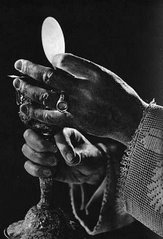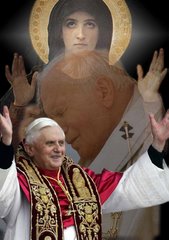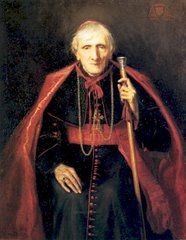New W policy means more stress - Opinion
Our own scapular-wearing Emily Byers evaluated LSU's new W policy. The party celebrating her debut column will be tonight at 9 pm at Serrano's. Please come show your support.
Wednesday, August 30, 2006
Tuesday, August 29, 2006
A Letter to the Parousians from James Schall, SJ
Father James Schall is a prominent political theorist who teaches at Georgetown University. His books include: The Praise of 'Sons of Bitches': On the Worship of God by Fallen Men; Another Sort of Learning: How Finally to Acquire an Education While Still in College or Anywhere Else, Containing Some Belated Advice About How to Employ Your Leisure Time When Ultimate Questions Remain Perplexing in Spite of your Highest Earned Academic Degree, Together With Sundry Book Lists Nowhere Else In Captivity to be Found; Does Catholicism Still Exist?; and Reason, Revelation, and the Foundations of Political Philosophy. Last spring, John Tate, a founding Parousian who is now beginning his master's program in mathematics at the University of Utah, presented on Schall's On the Unseriousness of Human Affairs: Teaching, Writing, Playing, Believing, Lecturing, Philosophizing, Singing, Dancing. Tate then wrote Schall to relay the purpose of the Parousians and our pleasure in his thoughts. We are forever grateful for Father Schall's kind acknowledgement. Knowing that any advice Schall offers is noteworthy, we offer his reply for public edification.
April 19,2006
John,
Thank you very much for your good letter. I appreciate your writing and admire your very legible and clear script. I envy it in fact.
Several years ago, I used to receive a student paper from LSU, which was quite good. At LSU, you have one of the finest of scholars and best of men in Ellis Sandoz, whom I am sure you know. Please give him my best, and let me assure you, he is a good guide in your projects. I have a wonderful tape of the Memorial Service at the Stanford Chapel when Eric Voegelin died. Ellis gave one of the eulogies and it still sticks in my memory of oral things, particularly his account of Voegelin’s work ethic and Ellis’ own account of how students, who really did not know who he was, reacted to him. He said, “We knew he was a great man.”
I am pleased that you would read the “unseriousness” book. Re: sports, if you know my Another Sort of Learning, there is an essay there on sports that you might enjoy.
I am pleased to see the books you have been reading. The “Parousians” – this title will not be known by many, but in a sense, it is a very good one, though Peter said in the office today that we are “sojourners and in exile.” At least in this world, as far as I have noticed!
Maritain’s thomistic circles were a good thing. I will send you a copy of a book I did on Maritain, as I have an extra copy. I have just begun reading the Summa Contra Gentiles which is quite a book and right on target today as it is basically a debate with Islam, who seems to be winning all the territory today while Europe sleeps and breeds not.
It sounds like you have a good group. Actually, Charlie Brown is a pretty good philosopher.
Comment about your group. The first is that you must keep it defined in terms of time and what can be expected. You are all busy. I am, as you know, of the view that it is very difficult to be educated in college – look up my interviews on NR and Claremont and zenit. So what you should be reading is what no one else will tell you about. Any of the books in my lists, or most, are short. This is deliberate (St. Thomas is long, but everything in short bites.) If you want to be educated, systematically read the works of Pieper, Chesterton, Lewis.
As you know, I do not directly recommend you doing Plato or Aristotle, do that in class if you have them there. Voegelin is difficult but at LSU it should be a must. Begin with his Conversation with Eric Voegelin. Or Sandoz’ book called The Voegelinian Revolution. Sandoz’ book on Dostoevsky is also important.
One of the best undergrad courses in philosophy is at U. of Nebraska at Kearney, believe it or not. I suggest you write to Thomas Martin, chair dept of philosophy there, and ask him for a copy of “the examined life” and a list of what they read. Tell him I sent you. You can find the address on Google – University of Nebraska at Kearney.
You should plan to read something of Chesterton every week, something short. See my Schall on Chesterton or the journal Gilbert Magazine.
Frankly, I have never been much for small discussion groups. Reading is more of a private enterprise to me at least first. I am a big fan of short essays, and think you should have some organ where you can publish what you write. On the other hand, face to face conversation is most welcome. I have a sort of pub theory which I get from Samuel Johnson, among others, that much of young men’s education comes from arguing in pubs. Chesterton said that the only things really worth arguing about are sex and religion, both of which lead to God sooner or later.
Two books I suggest you use are the two books of Jennifer Roback Morse, both published by Spence in Dallas ( a very good publishing house, by the way), 1) Love and Economics and 2) Smart Sex: How to Stay Married in a Hooked-Up World. Do not let the title of the latter throw you, the book is terrific.
You know of Walker Percy and Flannery, of course. I would read those books of JPII, Crossing the Threshold of Hope and Memory and Identity, among others. The books that are interviews with JPII and Benedict are usually very fruitful.
Well, enough. Thanks for writing, I quite appreciate it and am pleased that you did not fail to notice either sports or Charlie Brown.
Pray for me,
J Schall
April 19,2006
John,
Thank you very much for your good letter. I appreciate your writing and admire your very legible and clear script. I envy it in fact.
Several years ago, I used to receive a student paper from LSU, which was quite good. At LSU, you have one of the finest of scholars and best of men in Ellis Sandoz, whom I am sure you know. Please give him my best, and let me assure you, he is a good guide in your projects. I have a wonderful tape of the Memorial Service at the Stanford Chapel when Eric Voegelin died. Ellis gave one of the eulogies and it still sticks in my memory of oral things, particularly his account of Voegelin’s work ethic and Ellis’ own account of how students, who really did not know who he was, reacted to him. He said, “We knew he was a great man.”
I am pleased that you would read the “unseriousness” book. Re: sports, if you know my Another Sort of Learning, there is an essay there on sports that you might enjoy.
I am pleased to see the books you have been reading. The “Parousians” – this title will not be known by many, but in a sense, it is a very good one, though Peter said in the office today that we are “sojourners and in exile.” At least in this world, as far as I have noticed!
Maritain’s thomistic circles were a good thing. I will send you a copy of a book I did on Maritain, as I have an extra copy. I have just begun reading the Summa Contra Gentiles which is quite a book and right on target today as it is basically a debate with Islam, who seems to be winning all the territory today while Europe sleeps and breeds not.
It sounds like you have a good group. Actually, Charlie Brown is a pretty good philosopher.
Comment about your group. The first is that you must keep it defined in terms of time and what can be expected. You are all busy. I am, as you know, of the view that it is very difficult to be educated in college – look up my interviews on NR and Claremont and zenit. So what you should be reading is what no one else will tell you about. Any of the books in my lists, or most, are short. This is deliberate (St. Thomas is long, but everything in short bites.) If you want to be educated, systematically read the works of Pieper, Chesterton, Lewis.
As you know, I do not directly recommend you doing Plato or Aristotle, do that in class if you have them there. Voegelin is difficult but at LSU it should be a must. Begin with his Conversation with Eric Voegelin. Or Sandoz’ book called The Voegelinian Revolution. Sandoz’ book on Dostoevsky is also important.
One of the best undergrad courses in philosophy is at U. of Nebraska at Kearney, believe it or not. I suggest you write to Thomas Martin, chair dept of philosophy there, and ask him for a copy of “the examined life” and a list of what they read. Tell him I sent you. You can find the address on Google – University of Nebraska at Kearney.
You should plan to read something of Chesterton every week, something short. See my Schall on Chesterton or the journal Gilbert Magazine.
Frankly, I have never been much for small discussion groups. Reading is more of a private enterprise to me at least first. I am a big fan of short essays, and think you should have some organ where you can publish what you write. On the other hand, face to face conversation is most welcome. I have a sort of pub theory which I get from Samuel Johnson, among others, that much of young men’s education comes from arguing in pubs. Chesterton said that the only things really worth arguing about are sex and religion, both of which lead to God sooner or later.
Two books I suggest you use are the two books of Jennifer Roback Morse, both published by Spence in Dallas ( a very good publishing house, by the way), 1) Love and Economics and 2) Smart Sex: How to Stay Married in a Hooked-Up World. Do not let the title of the latter throw you, the book is terrific.
You know of Walker Percy and Flannery, of course. I would read those books of JPII, Crossing the Threshold of Hope and Memory and Identity, among others. The books that are interviews with JPII and Benedict are usually very fruitful.
Well, enough. Thanks for writing, I quite appreciate it and am pleased that you did not fail to notice either sports or Charlie Brown.
Pray for me,
J Schall
Come Celebrate
We will go out to Serrano's at 9 pm on Wednesday, August 30 to celebrate our own Emily Byers' debut as a columnist for the Daily Reveille. All are invited.
Trip to the Bayou Country on Sunday
The Parousians are travelling down the bayou to visit St. Elizabeth Church, arguably the most beautiful church in the diocese of Baton Rouge. Father Jason Labbe will feed us gumbo at the rectory and then offer a presentation entitled "The History of the Catholic Church in America: The Impact of the Papalencyclical of Pope Leo XIII Testem Benevolentiae Nostrae - The Rejection of American Particularism and Ecumenicalism." A discussion on individual liberty will follow. We will meet at the LSU Law School parking lot at 9:30 to carpool down to Paincourtville, participate in the 10:45 mass, and should return by 2:30 pm. Remember to bring gas money.
Monday, August 28, 2006
Who Are the Parousians?
In January of 2006, eight LSU students began to discuss the ideas that really matter. All loyal Catholics with a desire to learn, we leaned on each other's background in disciplines across the liberal arts and sciences to seek a comprehensive worldview where the faith and the culture met head-on, hoping to know the times and what we ought to do. A sort of informal philosophical and literary circle emerged, much akin to the Inklings, except perhaps in the way of brilliance. May the reader judge with charity. Still, we persisted. The Parousians were born, and this blog will contain our ponderings and pontifications. Please forgive us for thinking out loud, but at least there are some in this wayward generation who still choose to think.
Why choose the Parousians as our moniker? The Parousia is the Greek word for arrival, and all of us are at least hoping to get there. In extended Christian circles, it refers to the second coming. While we are not expecting the apocalypse in our lifetime, we figure we best be ready for it anyway. God has His way of bringing down the proud, and it reminds us to be humble. Kings and kingdoms fall, and one day each of us will be judged. And "Lord, come quickly" should be every Christian's prayer. More specific to our circle, the Catholic sees the Parousia at the moment of consecration when the bread and wine become the Body and the Blood of our Lord Jesus Christ. Jesus arrives everyday in the flesh. It is this sacramental view of life that teaches us how to see our culture.
Our heroes include the Chesterbelloc and the Inklings; St. Thomas Aquinas and St. Augustine and St. Therese; Walker Percy and Flannery O'Connor; Thomas Merton and Fulton Sheen; Dorothy Day and Russell Kirk; Cardinal Newman, Hans Urs von Balthasar, Alasdair MacIntyre, Wendell Barry, Eric Voegelin, Whit Stillman; Jim Stoner,LSU political theory and constitutional law professor, and Chris Baglow, theology professor at Holy Cross in New Orleans; the writers at Godspy; Father James Schall, Father Clifton Hill, Father Jason Labbe, and Father Bryce Sibley, as well as any other priest or religious who cares enough to write us or come hang out with us; Mother Teresa; Popes John XXIII, John Paul II, and Benedict XVI. Our heroes are more talented than us, and they have already made the world a better place. Please bear with us as we attempt to imitate them.
Why choose the Parousians as our moniker? The Parousia is the Greek word for arrival, and all of us are at least hoping to get there. In extended Christian circles, it refers to the second coming. While we are not expecting the apocalypse in our lifetime, we figure we best be ready for it anyway. God has His way of bringing down the proud, and it reminds us to be humble. Kings and kingdoms fall, and one day each of us will be judged. And "Lord, come quickly" should be every Christian's prayer. More specific to our circle, the Catholic sees the Parousia at the moment of consecration when the bread and wine become the Body and the Blood of our Lord Jesus Christ. Jesus arrives everyday in the flesh. It is this sacramental view of life that teaches us how to see our culture.
Our heroes include the Chesterbelloc and the Inklings; St. Thomas Aquinas and St. Augustine and St. Therese; Walker Percy and Flannery O'Connor; Thomas Merton and Fulton Sheen; Dorothy Day and Russell Kirk; Cardinal Newman, Hans Urs von Balthasar, Alasdair MacIntyre, Wendell Barry, Eric Voegelin, Whit Stillman; Jim Stoner,LSU political theory and constitutional law professor, and Chris Baglow, theology professor at Holy Cross in New Orleans; the writers at Godspy; Father James Schall, Father Clifton Hill, Father Jason Labbe, and Father Bryce Sibley, as well as any other priest or religious who cares enough to write us or come hang out with us; Mother Teresa; Popes John XXIII, John Paul II, and Benedict XVI. Our heroes are more talented than us, and they have already made the world a better place. Please bear with us as we attempt to imitate them.
Subscribe to:
Comments (Atom)





